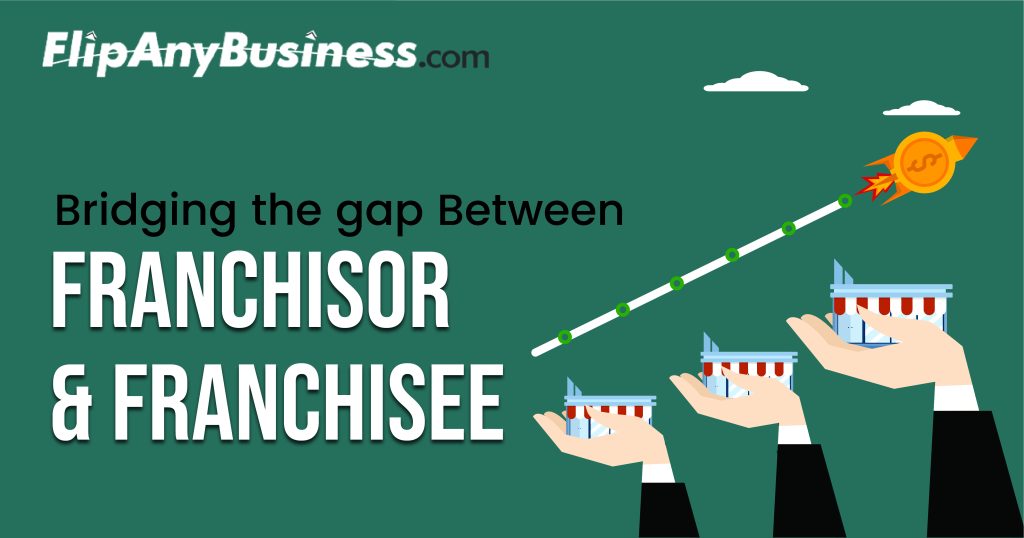Bridging the Gap Between Franchisor and Franchisee
In the expansive world of franchising, two key players steer the business forward: the franchisor and the franchisee. Though united in their ultimate aim—success—their journeys often diverge in ways that can create gaps between them. Imagine a partnership where both sides work in harmony, transforming challenges into opportunities for growth. This vision of shared success starts with recognizing each party’s unique perspectives and fostering communication, collaboration, and goal alignment.
Franchisee vs. Franchisor
Understanding the distinct roles of franchisees and franchisors is essential for a strong partnership. A franchisor represents the established company; they provide a successful business model, brand power, and resources to support franchisees in running their operations. Franchisees, on the other hand, are the local operators who buy into this brand, investing their time and capital to manage a branch while following the franchisor’s guidelines. Both roles are critical for success. Franchisees need robust support from franchisors, especially in training and marketing, while franchisees bring invaluable local insights that help the brand adapt effectively. Building a strong business together requires mutual respect and an appreciation of these unique roles.
Effective Communication
Effective communication is fundamental to a successful franchise relationship. Open dialogue builds trust, fosters teamwork, and aligns both parties on objectives and strategies. Regular check-ins are crucial; franchisors should schedule frequent meetings to discuss performance metrics and share best practices. These discussions help franchisees feel valued, while feedback provides a window into the franchise’s real-time issues, allowing for immediate adjustments.
Bridging the Local Marketing Gap
Local marketing often represents a critical point of difference between franchisors and franchisees. Franchisees understand their local community’s preferences and behaviors, which is essential for personalized marketing. By combining their community knowledge with franchisors’ marketing resources, they can create strategies that resonate locally. Franchisors who empower franchisees with co-branded campaigns and localized digital advertising tools enable them to connect more authentically with their community. Training sessions on local marketing challenges also help franchisees effectively adapt central strategies to local tastes.
Bridging the Operational Efficiency Gap
Improving operational efficiency between franchisors and franchisees involves adopting flexible, best-practice sharing approaches. Franchisors and franchisees benefit from a culture of feedback and innovation, where best practices across locations inform efficiency improvements. When franchisors support franchisees through targeted training in operational optimization, both parties achieve greater productivity and profitability.
Clarifying Expectations Between Franchisors and Franchisees
Clear expectations are essential in building mutual trust and respect. By establishing performance metrics and conducting regular check-ins, franchisors and franchisees can address any operational and financial discrepancies proactively. Detailed written agreements also serve as vital reference points, preventing misunderstandings. A culture that values feedback ensures a partnership based on transparency, allowing both sides to work toward long-term success.
The Role of Brokerage in Franchise Success
Brokerage firms have a unique role in franchising by bridging knowledge and communication gaps. Experienced brokers understand the franchise system from both sides, helping franchisees find opportunities that align with their goals while also supporting franchisors in finding the right candidates for their brand. Brokers provide insight into market trends, support smooth onboarding, and assist in solving operational challenges. By acting as a mediator, brokers create a collaborative environment conducive to franchise growth.
Aligning Business Goals for Franchisors and Franchisees
Aligning business goals strengthens the partnership between franchisors and franchisees. Franchisors benefit from understanding the unique challenges franchisees face in their respective markets, tailoring support accordingly. Franchisees should clearly communicate their objectives, enabling both sides to align on strategies. Regular meetings for shared goal-setting encourage collaboration and foster innovative solutions to challenges. Establishing key performance indicators (KPIs) keeps everyone accountable and focused on shared goals.
Financial Transparency for Both Parties
Financial transparency strengthens trust between franchisors and franchisees. Franchisors who provide detailed reports on fees, royalties, and profitability help franchisees plan and understand expected financial outcomes. Regular financial reviews foster open discussions on performance metrics and growth opportunities. Transparency not only mitigates potential tensions but also facilitates proactive problem-solving within the franchise network. This openness allows both sides to make informed decisions and fosters a stronger, trust-based partnership.
Conclusion:
The franchise industry thrives on solid relationships between franchisors and franchisees. Effective collaboration, rather than rigid control, fosters success for both parties. Brokerage firms emerge as vital intermediaries in this dynamic, facilitating communication, aligning expectations, and guiding both sides toward financial transparency. Their expertise supports seamless operations and proactive problem-solving. Bridging this gap is about more than individual success; it’s about fostering a unified, collaborative environment where both franchisors and franchisees can thrive.
